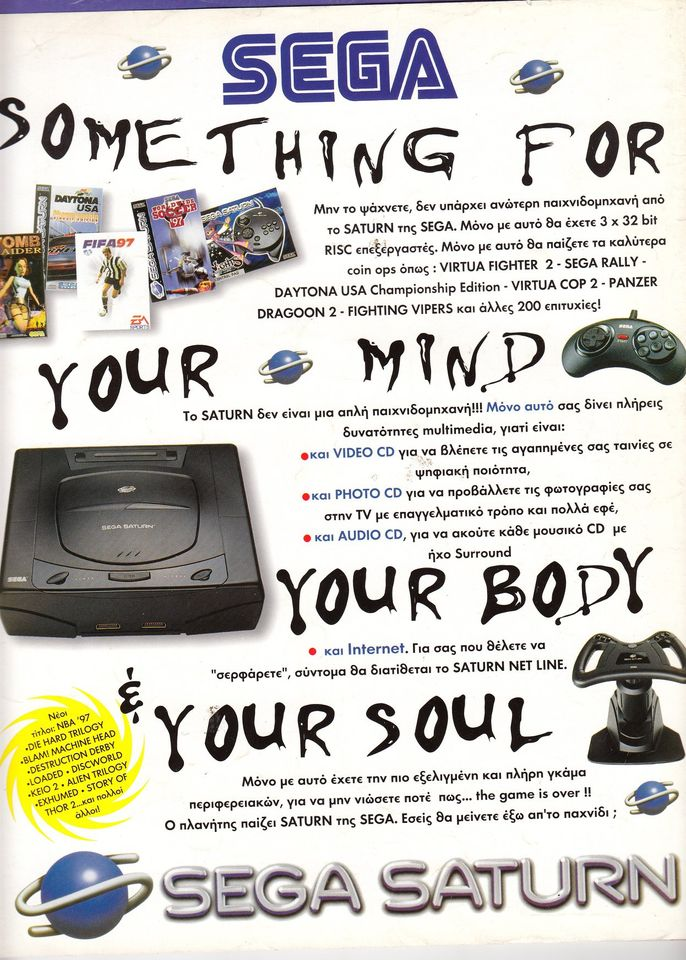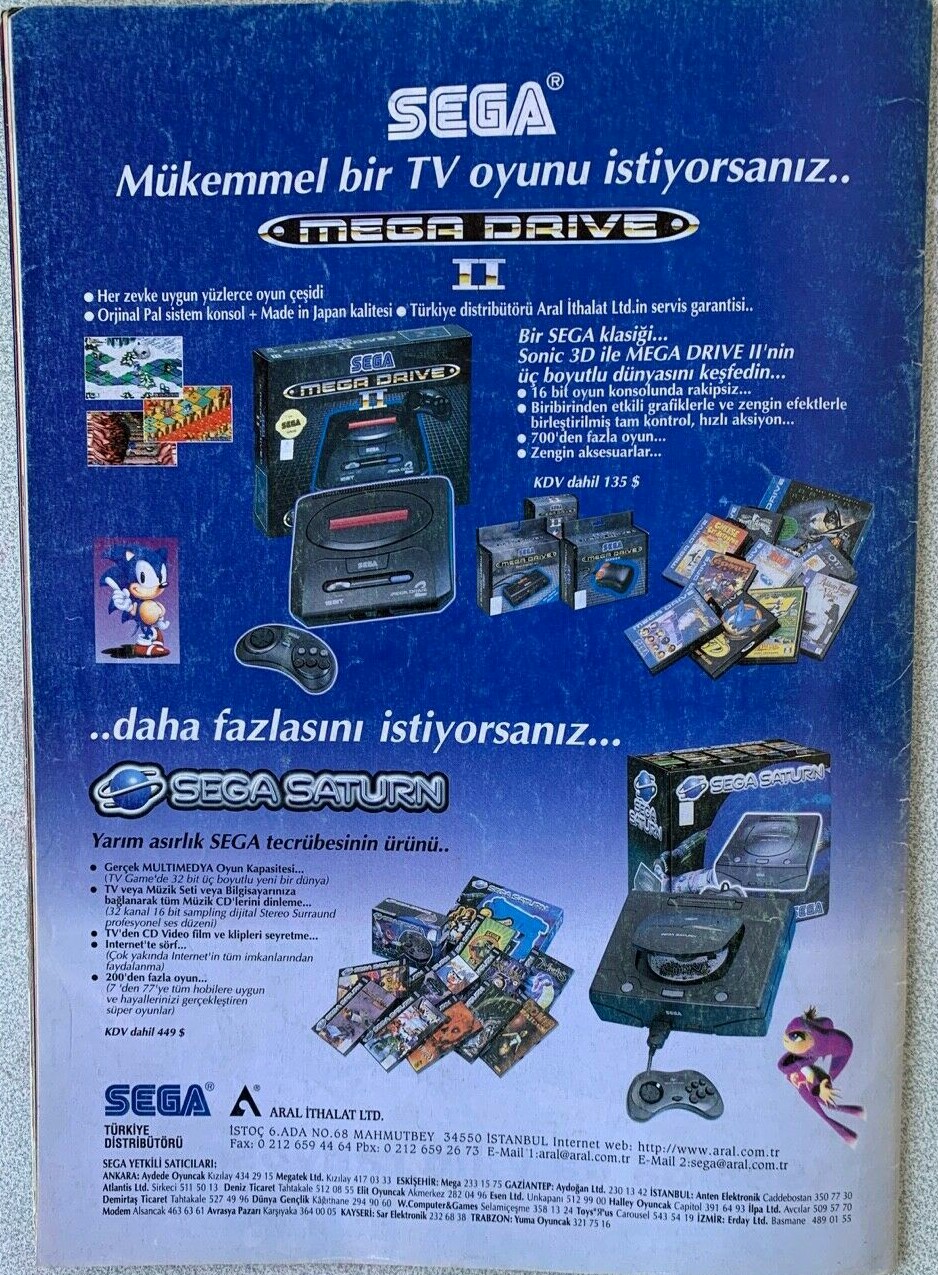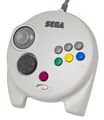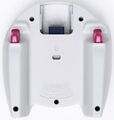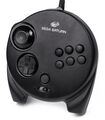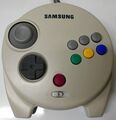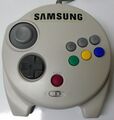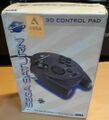Difference between revisions of "3D Control Pad"
From Sega Retro
| (3 intermediate revisions by 2 users not shown) | |||
| Line 3: | Line 3: | ||
| accessoryprogramscreen= | | accessoryprogramscreen= | ||
| title= | | title= | ||
| − | | maker=[[Sega]] | + | | maker=[[Sega Enterprises, Ltd.]] |
| + | | distributor={{company|[[Tec Toy]]|region=BR}}, {{company|[[Aral]]|region=TR}} | ||
| official=yes | | official=yes | ||
| madefor=[[Sega Saturn]] | | madefor=[[Sega Saturn]] | ||
| Line 21: | Line 22: | ||
}} | }} | ||
}} | }} | ||
| − | {{stub}}'''{{PAGENAME}}''', called the '''Sega Multi Controller''' (セガマルチコントローラー) in Japan, '''Samsung Multi Pad''' (삼성 멀티패드) in South Korea, and the '''Joystick 3D''' in Brazil, is a control pad developed for use with the [[Sega Saturn]]. Debuting with ''[[NiGHTS into Dreams]]'', it | + | {{stub}}'''{{PAGENAME}}''', called the '''Sega Multi Controller''' (セガマルチコントローラー) in Japan, '''Samsung Multi Pad''' (삼성 멀티패드) in South Korea, and the '''Joystick 3D''' in Brazil, is a control pad developed for use with the [[Sega Saturn]]. Debuting with ''[[NiGHTS into Dreams]]'', it featured an analogue thumbstick as opposed to relying solely on D-pads. Its design is similar to the [[XE-1AP]], a 1989 analogue thumbstick controller released for the [[Sega Mega Drive]] exclusively in Japan. |
Analogue sticks generally allow for greater precision in a 3D environment, which in 1996 were becoming more common in the console video game market. | Analogue sticks generally allow for greater precision in a 3D environment, which in 1996 were becoming more common in the console video game market. | ||
Latest revision as of 08:19, 16 November 2024

| ||||||||||||||||||||||||||||||||||||||||
| 3D Control Pad | ||||||||||||||||||||||||||||||||||||||||
|---|---|---|---|---|---|---|---|---|---|---|---|---|---|---|---|---|---|---|---|---|---|---|---|---|---|---|---|---|---|---|---|---|---|---|---|---|---|---|---|---|
| Made for: Sega Saturn | ||||||||||||||||||||||||||||||||||||||||
| Manufacturer: Sega Enterprises, Ltd. | ||||||||||||||||||||||||||||||||||||||||
| Distributor: Tec Toy (BR), Aral (TR) | ||||||||||||||||||||||||||||||||||||||||
|
This short article is in need of work. You can help Sega Retro by adding to it.
3D Control Pad, called the Sega Multi Controller (セガマルチコントローラー) in Japan, Samsung Multi Pad (삼성 멀티패드) in South Korea, and the Joystick 3D in Brazil, is a control pad developed for use with the Sega Saturn. Debuting with NiGHTS into Dreams, it featured an analogue thumbstick as opposed to relying solely on D-pads. Its design is similar to the XE-1AP, a 1989 analogue thumbstick controller released for the Sega Mega Drive exclusively in Japan.
Analogue sticks generally allow for greater precision in a 3D environment, which in 1996 were becoming more common in the console video game market.
Contents
Hardware
The 3D Control Pad builds on the features already seen in the standard Saturn Control Pad, containing an eight-direcional D-Pad, and ![]() ,
, ![]() ,
, ![]() ,
, ![]() ,
, ![]() ,
, ![]() and START face buttons. New to the controller is an analogue thumbstick (or "3D Directional Pad" as Sega called it), positioned on the left hand side of the controller above the D-Pad. Also inlcuded are analogue
and START face buttons. New to the controller is an analogue thumbstick (or "3D Directional Pad" as Sega called it), positioned on the left hand side of the controller above the D-Pad. Also inlcuded are analogue ![]() and
and ![]() shoulder triggers, a first for mainstream video game controllers.
shoulder triggers, a first for mainstream video game controllers.
To avoid compatibility issues, the analog controller has a switch under the start button to swap between "Digital" and "Analogue" modes. Switching to "Digital" mode disables all analogue settings, essentially turning the controller back into a standard control pad. This switch was vital, because earlier games were not built to understand the analogue technology and will not function correctly if the wrong mode is chosen. The original PlayStation and its latter dual-analogue controllers also required this feature.
The lead can also be removed from the controller for storage purposes.
The 3D Control Pad did not see widespread adoption for the same reason the Sega Saturn failed to capture a large share of the market in the west. The Saturn's 3D output was low, and as the controllers were never bundled with the console, consumers were more familiar with the standard Saturn control pads. It also has some design issues, namely the fact it is quite a lot bigger than most other controllers and arguably less comfortable than the standard pads for certain genres. Even in Japan, where the Saturn was successful, the controller was not used by many games (many of them coming from Sega, though some developers, such as KID, supported it quite a bit (in their case, even after Sega introduced the Dreamcast)).
The 3D Control Pad also works with games compatible with the steering wheel controllers, and the Mission Stick.
Compatibility
- Advanced World War: Sennen Teikoku no Koubou (1997)
- Baroque (1998)
- Battle Garegga (1998)
- Burning Rangers (1998)
- Can Can Bunny Extra (1997)
- Can Can Bunny Premiere 2 (1996)
- Choro Q Park (1998)
- Christmas NiGHTS into Dreams (1996)
- Code R (1998)
- Croc: Legend of the Gobbos (1997)
- Crypt Killer (1997)
- Daisenryaku Strong Style (1997)
- Daisuki (1997)
- Dark Savior (1996)
- Darklight Conflict (1997)
- Daytona USA Circuit Edition (1997)
- Daytona USA: C.C.E. NetLink Edition (1998)
- Daytona USA: Championship Circuit Edition (1996)
- Deep Fear (1998)
- Die Hard Trilogy (1997)
- Duke Nukem 3D (1997)
- Enemy Zero (1996)
- Fantastep (1997)
- Fuusui Sensei (1996)
- G Vector (1997)
- GT24 (1998)
- The House of the Dead (1997)
- Initial D: Koudou Saisoku Densetsu (1998)
- J.League Go Go Goal! (1997)
- Jungle Park: Saturn Jima (1998)
- Kiss Yori... (1999)
- Kuro no Danshou: The Literary Fragment (1997)
- The Lost World: Jurassic Park (1997)
- Magic Carpet (1996)
- Manx TT Super Bike (1995)
- Night Striker S (1996)
- NiGHTS into Dreams (1996)
- Nissan Presents Over Drivin' GT-R (1996)
- OoEdo Renaissance (1997)
- Panzer Dragoon Saga (1998)
- Panzer Dragoon Zwei (1996)
- Pia Carrot e Youkoso!! (1998)
- Planet Joker (1997)
- Powerslave (1996)
- Quake (1997)
- Sega Ages After Burner II (1996)
- Sega Ages Galaxy Force II (1998)
- Sega Ages OutRun (1996)
- Sega Ages Power Drift (1998)
- Sega Ages Vol. 2 Space Harrier (1996)
- Sega Ages: Volume 1 (1996)
- Sega Rally Championship Plus (1996)
- Sega Rally Championship Plus NetLink Edition (1997)
- Sega Touring Car Championship (1996)
- Shining Force III (1997)
- Sky Target (1995)
- Sonic 3D: Flickies' Island (1996)
- Sonic Jam (1997)
- Sonic R (1997)
- Soukyugurentai (1996)
- Soviet Strike (1997)
- Thunder Force V (?)
- Touge King the Spirits 2 (1997)
- Vatlva (1996)
- Virtua Cop 2 (1995)
- Virtuacall S (1998)
- Virtual Kyoutei (1996)
- Virtual Kyoutei 2 (1997)
- Wipeout 2097 (1997)
- World Cup '98 France: Road to Win (1998)
History
Development
Development of the 3D Control Pad was led by Kenji Tosaki, who had previously been in charge of the Virtua Gun.[4] It was created specifically to accompany NiGHTS into Dreams.[4] Many design cues appear to have been taken from the XE-1AP, an analogue thumbstick controller previously released for the Sega Mega Drive console in 1989, exclusively in Japan.
During development, Tosaki created and filed patents for numerous add-on concepts covering a number of possible extensions to the design[5], achieved through the port at the top of the controller. Covered ideas included wireless connections to the console (and light gun-style support)[6], extra joysticks[7] and trackballs[8], memory cards[9], a second display[10] (which may have later inspired the VMU), clocks[11], a rotatable stand[12] and motion control[13].
Potentially pre-dating attempts by Nintendo, feedback was also considered;[14] this and gyroscopic motion control would make it as far as physical prototypes.[4] However, commercialization of these and the filed concepts ultimately did not occur, due to concerns over the marketability and viability of add-on peripherals sold separately for what was a peripheral itself.[4]
Release
Notably the 3D Control Pad beat the Nintendo 64 to market by a month in the US and several months in Europe, so the Sega Saturn stands as the first video game console to support modern analogue stick support.
Legacy
The 3D Control Pad can be credited for many common features seen in controllers today, with its design greatly influencing that of the Sega Dreamcast Controller. Analogue shoulder buttons have since been adopted by Nintendo, Microsoft and Sony in the Nintendo GameCube, Xbox and PlayStation 3 (and their successors) and the placement of the analogue stick has also been copied by several firms, including Microsoft and Nintendo. Microsoft's Xbox and Xbox 360 controllers in particular borrow a number of design elements from the Dreamcast Controller and Saturn 3D Control Pad.
Localised names
| Language | Localised Name | English Translation |
|---|---|---|
| English | 3D Control Pad | 3D Control Pad |
| Japanese | セガ マルチ コントローラー | Sega Multi Controller |
| Portuguese (Brazil) | Joystick 3D | Joystick 3D |
| Korean | 삼성 멀티패드 | Samsung Multi Pad |
Magazine articles
- Main article: 3D Control Pad/Magazine articles.
Promotional material
also published in:
- Secret Service (PL) #44: "Marzec 1997" (1997-xx-xx)[15]
Patents
Photo gallery
Physical scans
| Saturn, JP (NiGHTS into Dreams) |
|---|
| Saturn, JP (Magic Carpet) |
|---|
| Saturn, US (NiGHTS into Dreams) |
|---|
| Saturn, EU (NiGHTS into Dreams) |
|---|
| Saturn, KR (NiGHTS into Dreams) |
|---|
| Saturn, CA |
|---|
|
| Saturn, TR (NiGHTS into Dreams) |
|---|
External links
References
- ↑ http://sega.jp/fb/segahard/ss/multi.html (Wayback Machine: 2013-10-25 03:44)
- ↑ File:NiGHTSintoDreams Saturn JP Spinecard Satakore.jpg
- ↑ Press release: 1996-08-12: $10 million "NiGHTS" launch is largest ever for Sega Saturn
- ↑ 4.0 4.1 4.2 4.3 Interview: Kenji Tosaki (2022-06-03) by Shiro
- ↑ File:Patent US7488254.pdf
- ↑ File:Patent US7488254.pdf, page 11
- ↑ File:Patent US7488254.pdf, page 14
- ↑ File:Patent US7488254.pdf, page 16
- ↑ File:Patent US7488254.pdf, page 18
- ↑ File:Patent US7488254.pdf, page 19
- ↑ File:Patent US7488254.pdf, page 20
- ↑ File:Patent US7488254.pdf, page 21
- ↑ File:Patent US7488254.pdf, page 22
- ↑ File:Patent US7488254.pdf, page 13
- ↑ Secret Service, "Marzec 1997" (PL; 1997-xx-xx), page 4

